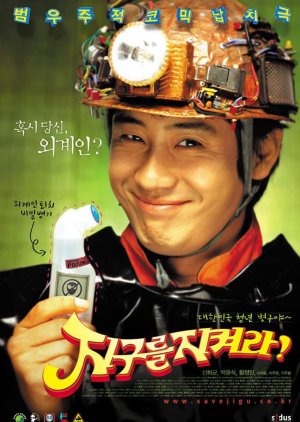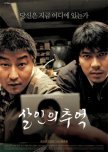Crazy Delight
Rewatching this gem after so many years, I am quite surprised how little recogniton this film has even among Korean film enthusiasts. There are fans who know all the main directors and love to watch arthouse directors, such as Hong Sang Soo, but whenever I ask them have you seen "Save the Green Planet?" I'm often met with a perplexed look: "What's that?"Save the Green Planet!, Jang Joon Hwan's feature-length debut film, is a sci-fi, comedy, psychological thriller. Yes, somehow Jang Joon Hwan also manages to masterfully weave the disparate genres all on his debut! The film is told from the perspective of Byeong Gu, a secluded beekeeper living in an isolated house on top of a mountain. This house, however, is no ordinary house; it was rebuilt over an abandoned mannequin factory allowing for a labyrinthian underground palace with various elaborate makeshift devices and traps. Byeong Gu is also no ordinary man. He is a delusional conspiracy theorist who is convinced that the CEO of a pharmaceuticals company is in fact an alien overlord. Sheer madness and hilarity ensues when Byeong Gu kidnaps and traps the CEO under his house. Byeong Gu attempts to torture the truth out of the CEO, while he goes on with his ordinary day-to-day activities, while avoiding the attention of authorities, and all while treading the thin line of sanity and insanity, if he hasn't already fallen over that is.
What I most appreciated about the film is how Jang Joon Hwan subverts the traditional hero's journey and what we have instead is a very confused and pitiful villain against an asshole victim. Our morals are constantly tested, the legal procedure is flipped, and just as we are complicit in Byeong Gu's devious acts, we also end up a little bit insane with him. The film ossicilates between the different genres quite naturally. It has moments of absurdity with surrealistic elements, but Jang Joon Hwan doesn't use the surreal as a cheap tool to lose the logical coherence of the film as most surrealist comedies do. Rather, it is a tool used to create or alleviate tension and self doubt. For maximal enjoyment of the film, I recommend not to view the film as morally prescriptive, but rather examine how Jang Joon Hwan plays around with various tropes and conventions.
Unfortunately, after Save the Green Planet's box-office flop, Jang Joon Hwan must await nearly a decade for another attempt at feature-length film. But by then, the damage is done; the creativity and ambitions of Save the Green Planet! is long gone and what's left is caged bird: the conventions that Jang Joon Hwan attempted to overcome becomes his shackles.
Esta resenha foi útil para você?
A Smart, Funny, Wildly Original Cult Classic
I can see why this flopped in Korea when it came out 20 years ago, just as I can see why it was a huge success on the American College circuit back then. Indeed, it still plays at some colleges due to its strong cult following. It appeals to a certain crowd because it's smart, funny, original and, finally, wildly creative in the way it criticizes how capitalism tramples on both human rights and environmentalism. More than anything, it's just plain weird. And that's its charm.The set up is pretty simple. A beekeeper thinks aliens are going to destroy the earth in 2 weeks during the lunar eclipse and that the alien leader hides among us disguised as the CEO of a vast chemical corporation. The beekeeper kidnaps the CEO and, together with his dimwitted girlfriend (who happens to be a circus tightrope walker), he commences to torture the CEO to glean information on how to save the planet from impending annihilation. The next 2 hours are a cat and mouse game between the beekeeper and the kidnapped CEO, while detectives search for them.
While one might think the film did not always succeed in tonal evenness because it vacillates between humor and violence, this was part of its brilliance. The viewer is not ever quite sure if they are supposed to be laughing at the hero for his ideas about aliens, alarmed by his violence, or sympathizing with him. But it's precisely this uncertainty that keeps us on our toes and gives an extra frisson to the viewing experience. We also don't know who to root for because as much as the CEO whom the hero kidnaps is a "victim" he is also the CEO of a chemical company notorious for polluting the environment. Moreover, he was shown in an early scene to be a rich jerk who stiffs poor working people like a cab driver. So we can't feel too much pity for this schmuck.
However, it's also hard to root for the hero because we simply are not certain of his sanity for most of the film. We don't find out if he's sane or not until the final 2 minutes. Keeping your viewer in doubt that long is a real risk, but the payoff was there when we got the answer at the end. I noted that some disliked the ending because it was simply too darn weird. But I see it as just one more of the film's riskier, wild, and out there twists. Besides, it afforded the single funniest line in the entire film when the guy said, "Of course I couldn't signal you, I had no hair!" You'll get the joke if/when you watch the film.
The film took a number of risks and nothing about it was formulaic. Indeed, I'd give it a 9.5 for sheer audaciousness alone. There must be others who agree, because Variety reported in February of 2024 that a Hollywood remake is in production with Emma Stone cast so far. I doubt it will be as good, so catch the original Korean version first.
Esta resenha foi útil para você?













































